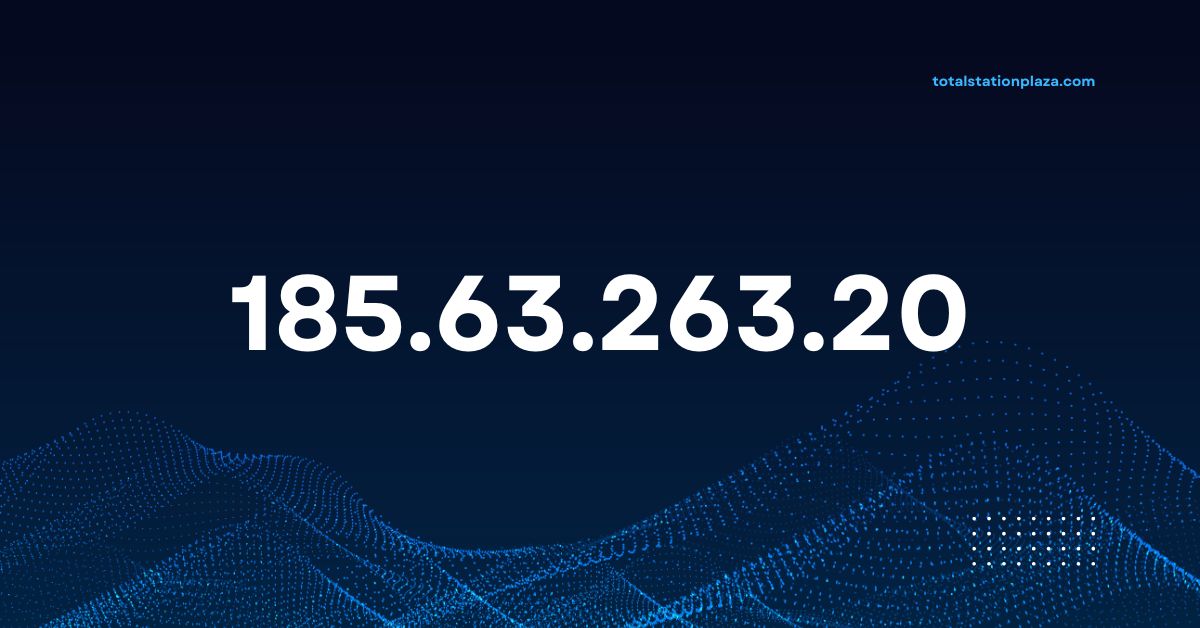The concept of IP addresses is vital for understanding how networks function, and “185.63.263.20” stands out as a unique identifier in the vast digital sphere. Every device connected to the internet relies on an IP address to send and receive data. Think of it as a digital address that allows computers, servers, and other devices to communicate seamlessly. But what exactly is “185.63.263.20”? Is it just another set of numbers, or does it hold a specific purpose? Let’s explore this topic in detail and unravel its significance in today’s digital landscape.
What Is an IP Address?
Before understanding the intricacies of “185.63.263.20,” it’s essential to grasp what an IP address is and why it matters. An IP address, short for Internet Protocol address, is a numerical label assigned to every device in a network. This label serves two key functions. First, it identifies the host, like a computer or a server. Second, it provides the location of the host within a network, enabling data transfer between devices.
IP addresses come in two versions today. The first, IPv4, uses a 32-bit format with numbers separated by periods, such as “185.63.263 20.” The second, newer version, IPv6, utilizes a complex 128-bit format to accommodate the growing need for unique IP addresses as more devices connect to the network.
You May Like : Caricatronchi – An Intriguing World to Discover
The Role of 185.63.263.20 in Networking
“185.63.263.20” is part of the IPv4 structure, a protocol that still dominates the internet due to its simplicity and widespread adoption. Like all IPv4 addresses, “185.63.263.20” can belong to a specialized purpose, such as identifying a server hosting a website or being used in communication ports for various applications.
For instance, suppose “185.63.263.20” is linked to a server. When you type a URL into your browser, such as www.example.com, that domain name gets translated to an IP address like “185.63.263.20” through a process called DNS resolution. The browser then uses this information to connect you to the appropriate server where the website is hosted.
Public vs. Private IPs and How 185.63.263.20 Fits
One might wonder whether “185.63.263.20” is a public or private IP address. Public IP addresses, like “185.63.263 20,” are visible to the entire internet and necessary for websites, online services, and public-facing servers. They’re allocated by internet service providers (ISPs) and are invaluable for direct communication across networks.
Private IP addresses, on the other hand, are restricted within local networks and aren’t directly accessible via the internet. For instance, a home Wi-Fi network may use private IPs to connect multiple devices internally.

Given its structure, “185.63.263.20” is a public IP address. Specific use cases often depend on the entity managing this IP, whether it’s a business, a server host, or an ISP.
Cybersecurity and the Importance of IP Monitoring
When discussing any public IP address, including “185.63.263.20,” cybersecurity naturally enters the discourse. Cyber threats such as hacking, phishing, and malware often exploit vulnerabilities within networks. Knowing the IP addresses interacting with your systems can help mitigate risks.
For example, if someone notices suspicious activity involving “185.63 263.20,” such as unauthorized attempts to access systems, they can take measures to avoid data breaches. Using software that tracks IP activity alongside firewalls and antivirus systems can significantly enhance overall network security.
The Geolocation of 185.63.263.20
Another intriguing aspect of public IP addresses like “185.63.263.20” is their ability to provide location-based details. Geolocation tools can trace the approximate physical location of an IP address. This is crucial for various purposes, such as content localization, targeted marketing, or spotting fraudulent activities.
With “185.63.263.20,” such tools could reveal its general location along with the associated internet service provider. Keep in mind, however, that IP geolocation isn’t always precise—it typically gives an overview rather than a pinpoint address.
Assigning and Managing Public IP Addresses
Every public IP address, including “185.63.263.20,” falls under the regulation of regional internet registries (RIRs). These organizations ensure proper allocation, preventing duplication or misuse. The five main RIRs cover different regions globally:
- ARIN (American Registry for Internet Numbers): Responsible for regions like the US, Canada, and the Caribbean.
- RIPE NCC (Réseaux IP Européens Network Coordination Centre): Covers Europe, the Middle East, and parts of Central Asia.
- APNIC (Asia-Pacific Network Information Centre): Manages allocations in Asia and Oceania.
- LACNIC (Latin American and Caribbean Internet Addresses Registry): Focuses on Latin American regions.
- AFRINIC (African Network Information Center): Handles Africa’s network needs.
For “185.63.263.20,” the corresponding RIR can provide insights into its assignment and administrative details.
Could 185.63.263.20 Be Blacklisted?
When discussing IP addresses, the topic of blacklisting often arises. Blacklisting occurs when an IP, such as “185.63.263.20,” engages in or becomes associated with malicious activities. This can range from sending spam emails to hosting harmful content.
If an organization discovers “185.63 263.20” on a blacklist, remediation steps involve pinpointing the source of the problem. It might involve improving server security, ensuring the address isn’t used for spam, or contacting the entity managing the blacklist to clear the IP after resolving any issues.
Troubleshooting Issues Related to 185.63.263.20
At times, users may encounter issues involving public IP addresses such as “185.63.263.20.” These can include denial of service, lagging connections, or inaccessible websites. Resolving these problems may involve:
- Checking DNS Configuration for incorrect IP mappings.
- Pinging the IP Address to confirm connectivity.
- Using Network Diagnostics Tools to identify where the trouble lies.
- Contacting ISPs or Admins if the problem persists.
Understanding the basic functioning of IPs enables swift and effective troubleshooting to ensure smooth network operations.
The Future of IPv4 and IPs Like 185.63.263.20
The relevance of “185.63.263.20,” like all IPv4 addresses, remains strong despite the growing adoption of IPv6. IPv4 shortages and higher demand for online connectivity have accelerated IPv6 implementation. However, transitioning fully to IPv6 will take time due to compatibility concerns and costs.
For now, IPv4 addresses like “185 63.263.20” continue powering websites, enabling communication, and maintaining seamless connections worldwide.
Final Thoughts on 185.63.263.20
Public IP addresses like “185.63.263.20” might seem like just a string of numbers, but they play a crucial role in how the internet functions. From enabling website access to supporting cybersecurity measures and troubleshooting connectivity, “185 63.263.20” is a vital cog in the digital machine.
Understanding the various facets involving “185.63.263.20,” its purpose, and how it fits within broader networking contexts can empower businesses and individuals to use online tools effectively. Whether ensuring safe browsing or exploring geolocation purposes, public IPs like this one remain integral to the digital world.
Read More : The Benefits of Joining a Gym Lumolog

